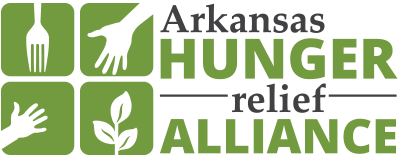Privilege in Public Service: Looking Beyond My Experience

Privilege in Public Service: Looking Beyond My Experience
By Becca Nelsen
Upon choosing to dedicate my first year out of college to serving on the Cooking Matters team at the Arkansas Hunger Relief Alliance, I had some vague expectations about what I would be doing. I expected to mostly teach cooking classes with low income individuals. One thing I did not expect was learning just how needed this service is here in my home state. I soon discovered that we are one of the worst states for child hunger, and rank a whopping #1 in senior hunger. Only now, while serving with the Alliance, do I realize that these are indeed real issues. Even now, however, they still seem so unreal.
Food insecurity only seems unreal because I have been privileged enough never to have faced such issues in my own life. Being food insecure means you don’t always know where your next meal is coming from. This experience is all too real for far too many Arkansas residents who face food insecurity daily. Not only can they not afford the nutrient-rich, high price fruits and vegetables at the front of the grocery store, but they oftentimes don’t have the knowledge needed to take advantage of our state’s resources for combatting food insecurity.
When you live a life of privilege, things come much more easily. Trust is a perfect example. I am far more trusting than I, perhaps, should be—of both people and entities. When you don’t have such privilege, you may be discriminated against, disfranchised, and taken advantage of, only making those daily struggles more difficult to overcome. Consider the process of applying for SNAP (formerly known as food stamps): Would you trust that you will receive follow-up on that application? Or even trust that your application would not be automatically denied if you made a small error on a complicated and oftentimes confusing official form? The distrust is not imagined; it is experienced. SNAP applications get dropped for no apparent reason, even when no one has taken the time to look at them. Officials rarely send the follow-ups to applications, and those seeking food assistance benefits are then left in the dust. It is easy to see how trust, once eroded, can be difficult to repair.
Having privilege means you don’t always have to worry about this. You don’t need to think about the issue of trust with official and governmental departments because they won’t disfranchise you because of your class, race or citizenship status. It has been quite a shock to work with people from low socioeconomic backgrounds, with disabilities, or any number of other factors that could affect the way they are systemically treated in our society.
Working on Cooking Matters through the Alliance has been more than eye-opening. It has been heart-wrenching and infuriating and awe-inspiring. It has put into perspective just how different others’ lives are from my own. The experience has taught me how to be aggressively friendly, communicative, and considerate in new ways that I’ve never thought to be. I’ve learned how important it is to be consistent and trustworthy, and what a challenge it is to be effective.
It isn’t always easy to consider and challenge a privilege from which you have always benefitted, but it is always necessary, especially in doing public service. The more you do it, the more natural it becomes, but it is a never-ending cycle. The more you learn, the more you recognize how different your reality is from others’. You might even learn some of that distrust and come to realize that the only person fit to challenge such inequalities is, in fact, you.
Becca Nelsen is an AmeriCorps Direct member serving with the Cooking Matters team of the Arkansas Hunger Relief Alliance. Becca is a graduate of Hendrix College where she received a B.A. in Anthropology. She will conclude her AmeriCorp Direct term of service in May, 2017.
